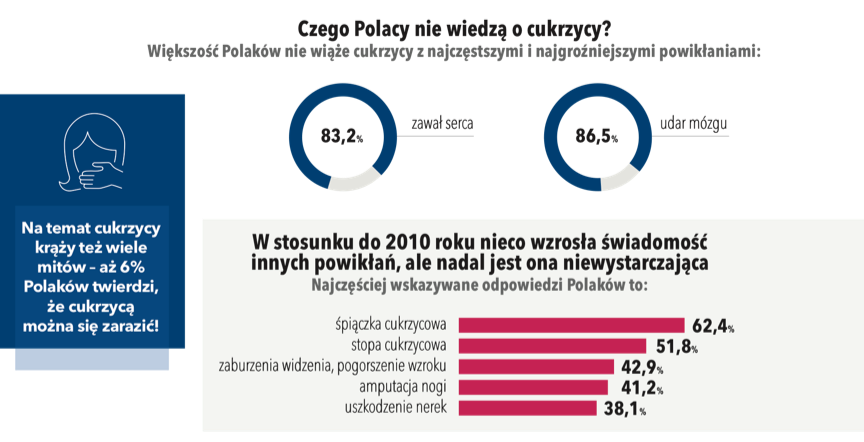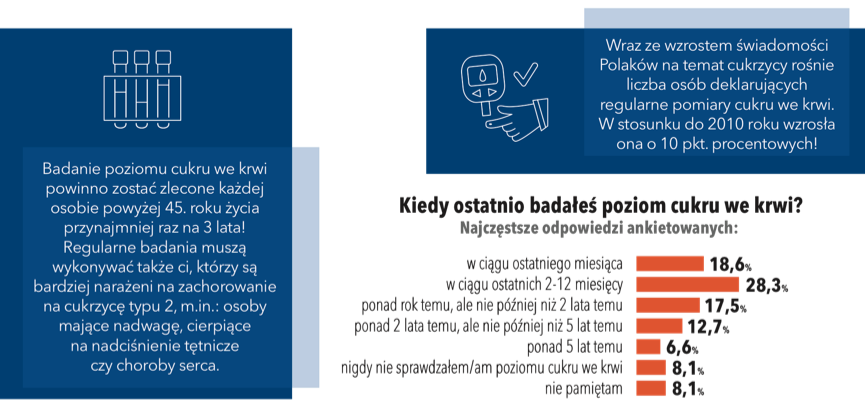The Diabetes Coalition has again asked Poles what they know about diabetes. The survey, 'Social Image of Diabetes', found that one in three respondents indicated that people with other diseases whose drugs have damaged their pancreas are at risk of diabetes, one in 10 adult Poles have never checked their blood sugar levels, and most do not associate diabetes with life-threatening complications such as heart attack or stroke. The survey was conducted as part of the "Racing with Diabetes" campaign. Public knowledge of diabetes and its prevention is increasing, but is still not high. One in 10 Poles has never had a blood glucose test, and only 30 per cent of respondents say they have had one in the past 12 months. Awareness of the consequences of diabetes is also insufficient. The vast majority have knowledge of diabetes complications such as impaired vision or diabetic foot, but only 15 per cent of respondents associate diabetes with heart attack and only 11 per cent with stroke. Despite a fairly low awareness of the effects of diabetes, more and more people know how to avoid the disease. More than 70% of those surveyed believe that checking blood sugar levels is a way to prevent diabetes. Almost two out of three respondents cited physical activity and 60% cited reducing sugar intake. More than half of respondents believe it is important to maintain a body weight appropriate for their height and lifestyle, and 44% indicate reducing the amount of fatty foods consumed. One in five respondents also point to a proper healthy diet as a way to avoid the disease. The 'Social Image of Diabetes' survey is being conducted for the second time, with the aim of re-testing Poles' knowledge of diabetes, and comparing the results to the first survey conducted in 2010. Compared to the results 7 years ago, it appears that our awareness of blood sugar testing has increased significantly. Just a few years ago, as many as one in five Poles never performed this type of test - now one in 10 of us does not. Knowledge of the effects of diabetes has also increased significantly - the most frequently mentioned effects are diabetic coma, diabetic foot, impaired vision and impaired eyesight. In a 2010 survey, almost 35 per cent of people were completely unaware of the answer to this question. Nowadays, we are also more aware of the symptoms of diabetes - according to those surveyed, the most common signs of diabetes are high blood sugar levels, a feeling of sleepiness during the day, and fatigue and weakness. As recently as 2010, as many as one in four respondents could not name any symptom of the disease, while now it is only about four per cent. 
 The survey shows that Poles' knowledge of diabetes has increased over the years. We are increasingly undergoing preventive screenings and have a greater awareness of who is most at risk of developing the disease. Unfortunately, many people are still unaware of the cardiovascular complications of diabetes, the most serious of which are myocardial infarction, ischaemic heart disease and stroke. Diabetes is hardly ever associated with such serious health complications and therefore may not be perceived as a life-threatening disease.
The survey shows that Poles' knowledge of diabetes has increased over the years. We are increasingly undergoing preventive screenings and have a greater awareness of who is most at risk of developing the disease. Unfortunately, many people are still unaware of the cardiovascular complications of diabetes, the most serious of which are myocardial infarction, ischaemic heart disease and stroke. Diabetes is hardly ever associated with such serious health complications and therefore may not be perceived as a life-threatening disease.
Organisation base
Poland's largest database of patient organisations. Use the search engine and check information on associations and foundations directing their help to the sick and their families.
Map of provinces
Select a province to display a list of medical organisations in that region.
Areas
Browse disciplines and search for organisations that support patients with specific conditions.
allergology
angiology
rare diseases
infectious diseases
dermatology
diabetology
endocrinology
gastroenterology
gastrology
genetics
geriatrics
gynaecology
haematology
hepatology
immunology
Other
cardiology
coagulology
laryngology
pain management
Treatment of obesity
addiction treatment
neatology
nephrology
neonatology
neurology
ophthalmology
oncology
palliative care
orthopaedics
otorhinolaryngology
Pediatrics
psychiatry
psychology
psycho-oncology
pulmonology
rehabilitation
rheumatology
transplantology
urology
